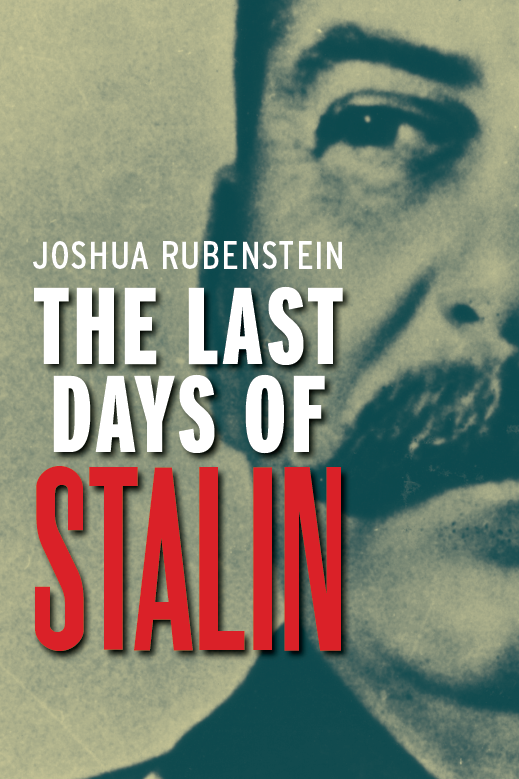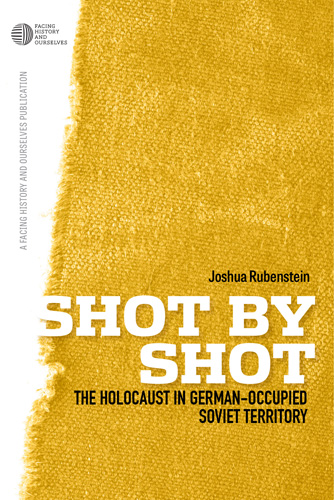The Last Days of Stalin is an engaging, briskly told account of the dictator’s final active months, the vigil at his deathbed, and the unfolding of Soviet and international events in the months after his death. It explores how the Soviet and Western press covered Stalin’s demise. And it throws fresh light on the Kremlin’s accusations that a group of Jewish doctors plotted to kill Soviet leaders; on Stalin’s rumored plans to forcibly exile Soviet Jews; and on the official disavowal of the Doctors’ Plot a month after Stalin’s collapse. His heirs quickly initiated a host of domestic reforms, reinforcing a number of conciliatory gestures toward the West. Prime Minister Winston Churchill urged President Eisenhower and Secretary of State Foster Dulles to respond favorably to the Kremlin, hoping to see a relaxation of tension and perhaps even an end to the burgeoning Cold War, a conflict that continued for another four decades.
Shot by Shot: the Holocaust in German-Occupied Soviet Territory, is an eBook published by Facing History and Ourselves in Brookline, Massachusetts. It contains survivor testimony and archival video footage as well as primary source documents about the mass killings of Jews carried out by the Nazis in Soviet territories. In the months following the German invasion of the Soviet Union in June 1941, the Nazis murdered nearly a million Jews in Lithuania, Latvia, Estonia, Ukraine, Belorussia, and Russia. It was here before the Nazis killed a single person in the gas chambers of Treblinka, or took the Jews of Western Europe by train to killing centers in Poland, that they first embarked on their murderous intentions.
Stalin’s Secret Pogrom: The Postwar Inquisition of the Jewish Anti-Fascist Committee presents the long-suppressed transcript of the secret trial of fifteen Jewish figures, including five prominent Soviet Jewish poets and writers, which unfolded in the spring and summer of 1952. The Jewish Anti-Fascist Committee had been part of the Kremlin’s fully authorized initiative to encourage support for the war-time alliance between the Soviet Union and the western democracies. But what committee members did during the war, including their efforts to document Nazi atrocities against the Jews on German-occupied Soviet territory, was held against them as the newly emerging Cold War infected relations with the West. A volume in the Annals of Communism Series of Yale University Press.
Stalin’s Secret Pogrom received a National Jewish Book Award in the Eastern European Studies category in 2001-2002.
Tangled Loyalties: The Life and Times of Ilya Ehrenburg uncovers the man behind the controversies, the gifted writer whose life embodied all the tragic dilemmas of a Russian Jewish intellectual under a totalitarian regime. Journalist, novelist, and poet, Ilya Ehrenburg (1891-1967) was one of the most important Russian cultural figures of the 20th century. In vivid detail, Tangled Loyalties draws extensively on material from Russian archives, from Ehrenburg’s private correspondence, and from interviews with scores of family members and friends to tell Ehrenburg’s story. This penetrating biography challenges our assumptions about collaboration, dissent, and moral survival.
The KGB File of Andrei Sakharov contains 146 reports by the Soviet secret police to the leadership of the Communist Party about the activities of Academician Andrei Sakharov (1921-1989). Sakharov, a brilliant physicist and the principal designer of the Soviet hydrogen bomb, later became a human rights activist and – as a result – a source of profound irritation to the Kremlin. The documents reveal the untold story of KGB surveillance of Sakharov from 1968 until his death in 1989 and of the regime’s efforts to intimidate and silence him and his wife, Elena Bonner. In his introduction, Rubenstein explores how the human rights movement affected the policies of Mikhail Gorbachev when Gorbachev, determined to initiate democratic reform of Soviet society, implemented his policies of glasnost and perestroika. A volume in the Annals of Communism Series of Yale University Press.
The Unknown Black Book: The Holocaust in the German-Occupied Soviet Territories provides testimonies from Jews who survived open-air massacres and other atrocities carried out by the Nazis and their allies in occupied Soviet territories. These documents are often raw, first-hand accounts. Collected under the direction of two renowned Soviet Jewish journalists, Ilya Ehrenburg and Vasily Grossman, they tell of Jews who lived in pits, walled-off corners of apartments, attics, and basement dugouts. In his introduction to the volume, Joshua Rubenstein examines the Final Solution on the Russian Front, how the Soviet regime responded to the slaughter of its own citizens, and the postwar trial of the perpetrators at Nuremberg.
Leon Trotsky: A Revolutionary’s Life is a concise biography of a major figure of the twentieth century. Born Lev Davidovich Bronstein in southern Ukraine, Trotsky was an effective military strategist and an adept diplomat who staked the fate of the Bolshevik Revolution on the meager foundation of a Europe-wide Communist upheaval. In this biography, Trotsky emerges as a brilliant and brilliantly flawed man. Rubenstein offers us a Trotsky who is mentally acute and impatient with others, one of the finest students of contemporary politics who refused to engage in the nitty-gritty of party organization in the 1920s, when Stalin was maneuvering, inexorably, toward Trotsky’s own political oblivion. A volume in the Jewish Lives Series of Yale University Press.
Now Available as an Audio Book Through Amazon Audible


